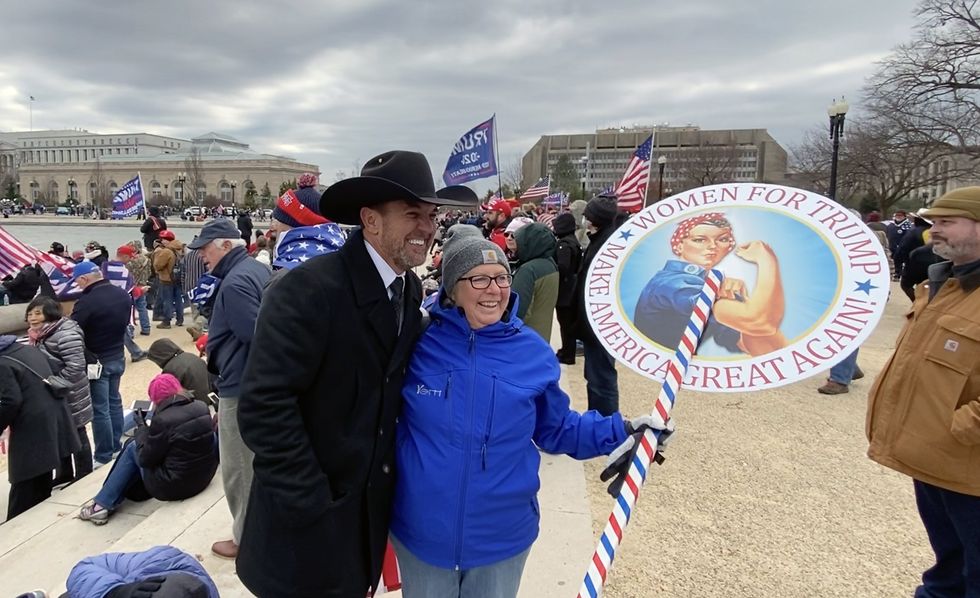
Couy Griffin, founder of Cowboys for Trump. U.S. Department of Justice Photo

'Knowingly entering and remaining in a restricted building or grounds' could be headed to the Supreme Court.
A federal appeals court upheld a misdemeanor trespass charge used against more than 1,400 defendants who protested at the U.S. Capitol on Jan. 6, but the issue could end up before the U.S. Supreme Court.
In a 45-page ruling, a three-judge panel upheld the conviction of Jan. 6 defendant Couy Griffin on a charge of knowingly entering and remaining in a restricted building or grounds under U.S. Code 18 §1752(a)(1).
The two judges signing the majority opinion for the U.S. Court of Appeals for the District of Columbia Circuit were Cornelia Pillard — an appointee of President Barack Obama — and Judith Rogers, appointed by President Bill Clinton.
Judge Gregory Katsas, appointed to the bench by President Donald J. Trump, filed a 22-page dissenting opinion.
The statute is designed to protect the president, vice president, and other top government officials from trespassers. It has two elements: The area in question must be “posted, cordoned off or otherwise restricted” and be one where “the president or other person protected by the Secret Service is or will be temporarily visiting.”
'I would vacate Griffin’s conviction and remand for further findings or proceedings.'
Griffin entered the west lawn of the U.S. Capitol just after 2:30 p.m. on Jan. 6, walked onto the West Plaza and up a flight of stairs to the inauguration stage, where he prayed and spoke to the crowd below using a bullhorn.
Griffin, the founder of Cowboys for Trump, argued that he was not aware that Vice President Mike Pence being in the U.S. Capitol was the basis for the second element of §1752(a)(1).
Pence presided over the ceremonial counting of Electoral College votes from the 2020 presidential election during a joint session of Congress on Jan. 6. He was evacuated from the U.S. Senate at 2:11 p.m. and moved to a secure loading dock just before the Capitol was breached by the swelling crowds.
After a March 2022 bench trial before U.S. District Judge Trevor McFadden, Griffin was found guilty of violating §1752(a)(1) and not guilty of a charge that he intended to disrupt the orderly conduct of government business. Judge McFadden made no finding whether Griffin knew that the vice president would be present on Jan. 6.
Three months later, Griffin received a time-served prison sentence. He had spent 20 days in pretrial detention. His appeal of conviction was argued before the U.S. Court of Appeals on Dec. 4, 2023.
In her client’s appeal, assistant federal public defender Lisa Wright said as Griffin approached the Capitol, “There was no signage or police presence indicating that he was not allowed to be there.”

“A reasonable person would expect that, if a part of the Capitol grounds was meant to be closed, there would be some signage, barricades, or police presence to tell him so,” Wright wrote in her appeal brief. “But everywhere Mr. Griffin went–past walls that enclosed nothing and through an open door near the base of the Capitol steps–he encountered no postings or police suggesting he had reached an area that was off-limits.”
Wright said that prosecutors had not proven that Griffin knew the vice president was still at the Capitol. Some 45 minutes before he set foot on the West Lawn, evidence showed Griffin remarked that Pence “certified it,” referring to the Electoral College tally.
In the majority opinion, Judges Rogers and Pillard wrote that prosecutors did not need to prove that Griffin knew the vice president was present in order to satisfy elements of the crime.
“We hold that the trial evidence sufficed to prove that the Capitol grounds were ‘posted, cordoned off, or otherwise restricted’ under section 1752(c)(1), and that Griffin knew they were so restricted when he entered and remained there,” they wrote. “We further hold that the government was not required to prove that Griffin knew when he entered and remained in the restricted area that Vice President Pence was still there.”
In his dissent, Judge Katsas said knowledge that an area is restricted and that a protectee of the U.S. Secret Service such as the vice president is present are both necessary for a conviction.
“Some evidence suggests Griffin did not know, such as his later, mistaken statement that the vice president had already certified the election before Griffin arrived at the Capitol,” Katsas wrote. “Because an essential element of the section 1752(a)(1) charge thus remains unresolved, I would vacate Griffin’s conviction and remand for further findings or proceedings.”
Many defense attorneys expect the questions raised in the Griffin case to end up before the Supreme Court, which in June issued a ruling strictly limiting use of an accounting-fraud statute to prosecute Jan. 6 defendants.
The DOJ had charged more than 350 Jan. 6 defendants with the felony crime of obstruction of an official proceeding for the delay of the session of Congress. But the High Court said 18 U.S. Code §1512(c)(2) could apply only to documents or other evidence used in a proceeding.
As of Aug. 6, the DOJ had charged 1,417 people with knowingly entering and remaining in a restricted building or grounds — the most common Jan. offense.
However, the DOJ stopped reporting that total in its September and October statistical summaries. Instead, it inserted this language: “All defendants charged in the January 6 prosecution have been charged with some form of trespass or disorderly conduct, in violation of federal criminal codes.”
Hear more on the subject from the "Blaze News Tonight" team in the video below:
Like Blaze News? Bypass the censors, sign up for our newsletters, and get stories like this direct to your inbox. Sign up here!